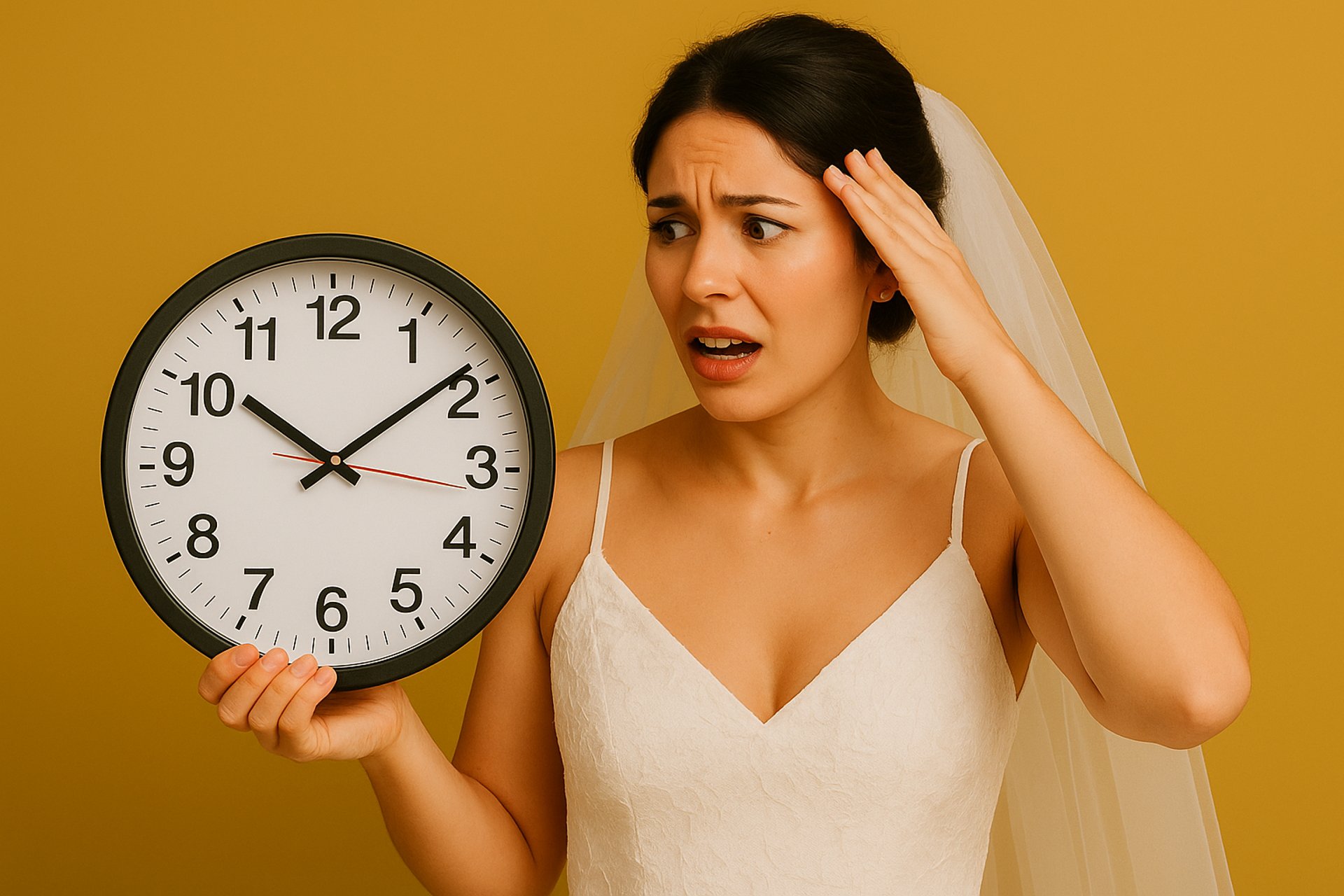WEDDING SEASON SALE! THE AI WEDDING PLANNER GUIDE NOW $27

27 Wedding Timeline Mistakes That Ruin Your Entire Day
Many of these insights come from AI analysis of thousands of wedding timelines, identifying patterns that consistently lead to smooth celebrations versus those that create day-of chaos.
Caroline
4/7/20256 min read
Your timeline looks perfect on paper. Every vendor has confirmed their arrival times, you've built in buffer periods, and everything should flow seamlessly from getting ready through your grand exit. Then wedding day arrives, and somehow everything runs an hour behind schedule, your photographer misses the sunset shots you dreamed about, and you're rushing through dinner to stay on track for your venue's strict end time.
Timeline disasters don't happen because couples don't plan... they happen because most timelines are built on unrealistic assumptions, ignore vendor coordination needs, or fail to account for the emotional realities of wedding days. These mistakes compound throughout the day, turning minor delays into major stress and missed moments.
The couples who have relaxed, perfectly paced wedding days aren't just lucky... they've learned to anticipate the timeline traps that derail celebrations and build schedules that work with human nature rather than against it. Many of these insights come from AI analysis of thousands of wedding timelines, identifying patterns that consistently lead to smooth celebrations versus those that create day-of chaos.
Getting Ready Phase Mistakes
1. Underestimating Hair and Makeup Time
Most couples calculate based on normal daily routines, not wedding day perfection. Wedding hair and makeup takes 50% longer than daily beauty routines, especially when multiple people need services. Build in extra time for touch-ups, outfit changes, and the inevitable "one more curl" requests.
2. Not Scheduling Vendor Arrival Coordination
Your photographer wants getting-ready shots at 10 AM, but your florist is delivering bouquets at 10:15 AM, creating chaos when both vendors need the same space. Coordinate vendor arrivals to prevent conflicts and ensure each professional can work efficiently.
3. Forgetting to Schedule Eating Time
Nervous couples often skip breakfast, then feel lightheaded during ceremony photos. Wedding days require sustained energy, so schedule proper meals during getting ready, not just coffee and pastries that create energy crashes.
4. Overestimating Getting Dressed Efficiency
Wedding attire involves more complexities than regular clothes... bustles, cufflinks, jewelry coordination, final touch-ups. Allow 45 minutes for getting dressed, not the 15 minutes you'd normally need.
5. Not Planning Transportation Buffer Time
Wedding day transportation always takes longer than expected due to photo stops, traffic, and coordination delays. Build 25% extra time into any travel between locations.
Photography and Video Mistakes
6. Scheduling Photos During Worst Light
Outdoor ceremonies at 2 PM create harsh shadows and squinting guests. Work with your photographer to identify optimal lighting times and build your timeline around these natural constraints.
7. Underestimating Group Photo Time
Family photos with 15 people take longer than couple portraits. Allow 5-7 minutes per family grouping, plus coordination time between setups. Rush jobs result in awkward expressions and missed family members.
8. Not Accounting for Vendor Setup During Photo Time
While you're taking sunset portraits, vendors need access to reception spaces for final setup. Coordinate photo locations and timing to prevent vendor conflicts that create last-minute stress.
9. Forgetting Golden Hour Timing Changes
Sunset timing changes throughout the year, but many couples plan based on initial research rather than actual wedding date timing. Verify lighting conditions for your specific date and season.
Ceremony Coordination Mistakes
10. Not Building in Guest Arrival Buffer
Guests arrive over 20-30 minutes, not all at once. Starting ceremony immediately when timeline says "guests arrive" means half your audience misses processional moments.
11. Ignoring Vendor Setup Requirements
Florists need 45-60 minutes for ceremony setup, musicians require sound check time, and coordinators need final walk-throughs. Schedule vendor setup time that doesn't conflict with guest arrival or photography needs.
12. Underestimating Ceremony Length
Personal vows, cultural traditions, and meaningful rituals extend ceremony time beyond basic legal requirements. Account for your specific ceremony elements rather than assuming standard timing.
13. Not Planning for Weather Contingencies
Outdoor ceremonies need realistic backup plans that don't just change location but adjust entire timeline for different vendor requirements and guest logistics.
Reception Transition Mistakes
14. Creating Dead Time Between Events
Guests need activities during cocktail hour, especially if ceremony ran late. Plan engaging experiences rather than assuming people will naturally mingle for extended periods.
15. Not Coordinating Vendor Reset Time
Ceremony to reception transitions require vendor coordination for space flips, equipment moves, and final setup. Allow realistic time for these logistics without creating guest experience gaps.
16. Forgetting Guest Transportation Coordination
If ceremony and reception locations differ, guest transportation timing affects when reception activities can realistically begin. Coordinate these logistics to prevent empty reception starts.
Reception Flow Mistakes
17. Scheduling Dinner Too Early or Too Late
Dinner timing affects guest energy, alcohol impact, and celebration flow. Too early feels rushed, too late creates hangry guests and energy crashes.
18. Cramming Too Many Special Moments
First dance, parent dances, toasts, cake cutting, bouquet toss... cramming every tradition into reception creates rushed feeling and prevents natural celebration flow.
19. Not Understanding Vendor Service Timing
Caterers need specific timing for course service, bands require setup periods between sets, and photographers need coordination for special moment coverage. Understand each vendor's timing needs.
20. Ignoring Guest Energy Management
Reception energy naturally ebbs and flows. Schedule high-energy moments when guests are most engaged and quieter elements during natural low-energy periods.


Vendor Coordination Mistakes
21. Not Creating Master Vendor Timeline Each vendor working from different timeline information creates coordination disasters. Develop single master timeline that all vendors reference for consistent coordination.
22. Forgetting Vendor Meal and Break Needs Vendors working 8-12 hour days need meal breaks and rest periods. Failing to plan vendor care leads to tired professionals and potential service gaps.
23. Overlooking Load-In and Load-Out Requirements Vendor setup and breakdown takes significant time and space. Coordinate these logistics to prevent conflicts and ensure smooth execution without guest disruption.
24. Not Designating Timeline Authority When timeline changes become necessary, unclear decision authority creates chaos. Designate who can make timing adjustments and ensure all vendors understand communication hierarchy.
Weather and Contingency Mistakes
25. Creating Unrealistic Backup Plans Weather contingencies need complete timeline adjustments, not just location changes. Indoor alternatives often require different vendor timing, guest flow, and coordination approaches.
26. Not Communicating Contingency Triggers Decision points for weather changes need clear triggers and communication plans. Last-minute confusion about backup plan activation creates unnecessary stress and poor vendor coordination.
27. Building Rigid Schedules Without Flexibility Wedding days involve unpredictable elements... emotions, family dynamics, vendor delays, weather changes. Rigid timelines break under real-world pressure, while flexible frameworks adapt gracefully.
The AI Advantage in Timeline Creation
Smart couples now use AI to analyze their specific wedding elements and create timelines that account for realistic timing, vendor coordination needs, and common delay patterns. AI can identify potential conflicts before they become problems and suggest buffer periods in exactly the right places.
AI timeline analysis considers factors like your venue's specific requirements, your vendor team's coordination needs, guest count implications for photo timing, and seasonal considerations that affect everything from lighting to guest comfort.
When Perfect Timing Creates Perfect Days
Sarah and Mike's original timeline looked comprehensive but contained several critical mistakes... unrealistic photo timing, insufficient vendor coordination, and no flexibility for natural celebration flow. Their day-of coordinator identified potential problems, but fixing them required last-minute adjustments that created stress.
Learning from this experience, they used AI to analyze their timeline for potential issues and rebuild it with realistic timing, proper vendor coordination, and strategic flexibility. Their revised timeline turned a potentially stressful day into a celebration that flowed naturally and felt relaxed despite complex logistics.
The difference was systematic analysis that identified problems before they occurred, rather than reactive problem-solving when issues were already affecting their celebration.
Perfect wedding timelines aren't about controlling every minute... they're about creating frameworks that support natural celebration flow while ensuring all vendors can deliver their best work without conflicts or stress.
While understanding these common timeline mistakes helps you avoid major problems, creating timelines that truly work requires comprehensive analysis of your specific vendors, venue, and celebration elements. Individual timeline adjustments are helpful, but systematic timeline optimization using AI analysis delivers the smoothly flowing wedding days that couples dream about.
That's exactly what I've created in the AI Wedding Planning guide. It's not just about avoiding timeline mistakes... it's a comprehensive system that helps couples create timeline frameworks that ensure smooth, stress-free wedding days while maximizing every meaningful moment.
The guide includes AI-powered timeline optimization techniques, vendor coordination strategies that prevent conflicts, and comprehensive day-of management approaches that keep celebrations flowing beautifully. Plus 5 bonus guides covering budget optimization, vendor coordination mastery, guest experience design, negotiation strategies, and advanced timeline management.
If avoiding these 27 timeline mistakes can transform your wedding day from stressful to seamless, imagine what a complete AI-optimized timeline system can do for your entire celebration experience. Your perfectly paced wedding day is absolutely achievable when every timing decision is strategically planned.

